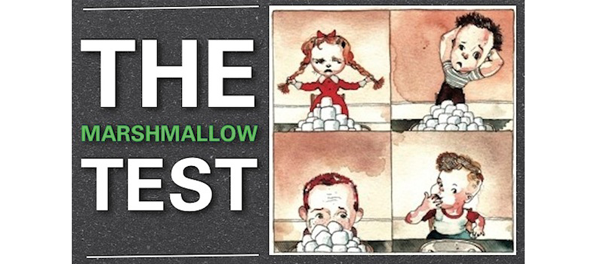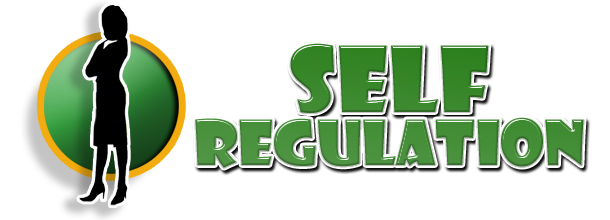2nd Core of Emotional Intelligence: Self Regulation
In the 60s, a psychologist called Walter Mischel conducted a now famous experiment at a preschool on the Stanford University campus. The researcher took children (around the age of four) into a room one by one and then placed a marshmallow on the table in plain sight. He proceeded to tell the child that they could have the marshmallow right away, but if they wait while he goes on an errand then he will give them a second marshmallow once he returns… but only if they didn't eat the first one.
Can you image the torment that was about to be unleashed on these poor four year olds?
Here's what happened: Some grabbed for it immediately; some tried desperately to hold onto their sanity, but only lasted a few minutes; while others were able to resist the torture for the full 15 minutes and "doubled their money" when the researcher returned.
The same children were later tracked down in high school. Apart from being generally better adjusted, more popular, confident and dependable teenagers, the kids that had waited longest had an average score of 210 points higher on their SAT results than the kids that grabbed for it quickest (something that was totally unexpected).
Even at four years old, a simple test with a squishy confection could reveal the power that good emotional management would have on their futures.

Self Regulation Quotes:
“He who conquers himself is the mightiest warrior.” - Confucius
“Most powerful is he who has himself in his own power.” - Seneca
“Discipline is the bridge between goals and accomplishment.” - Jim Rohn
“It is folly for a man to pray to the gods for that which he has the power to obtain by himself.” - Epicurus
“Anyone can become angry - that is easy, but to be angry with the right person at the right time, and for the right purpose and in the right way - that is not within everyone's power and that is not easy.” - Aristotle
“Nothing in the world can take the place of Persistence. Talent will not; nothing is more common than unsuccessful men with talent. Genius will not; unrewarded genius is almost a proverb. Education will not; the world is full of educated derelicts. Persistence and determination alone are omnipotent.” - Calvin Coolidge
“Fear defeats more people than any other one thing in the world.” - Ralph Waldo Emerson
"The first attribute that characterises the greater man from the moron is his thicker layer of inhibition." - Martin H. Fischer
"I can not teach him, the boy has no patience." - Yoda

Self Regulation Defined:
The ability to control or redirect disruptive impulses and moods and the propensity to suspend judgment and think before acting.
The ability to regulate our emotional state stems from Self Awareness. Regulating does not mean ignoring or suppressing how you are feeling; it is about finding appropriate and mature ways to direct emotional energy into a productive endeavour. In the marshmallow experiment, the successful ones were those who found a way to distract themselves - by humming a tune, playing a game, covering their eyes, and even going to sleep - anything that would keep their mind off the marshmallow.
Goleman describes self regulation as a master aptitude. In some of his later writings, Goleman refers to Self Regulation as “Self Management”.
The 5 core components of Self Regulation are:
- Self Control (keeping disruptive emotions and impulses in check)
- Trustworthiness (maintaining standards of honesty and integrity)
- Conscientiousness (taking responsibility for personal performance)
- Adaptability (remaining flexible and open to change)
- Innovation (being comfortable with novel ideas, approaches and new information)
People with high levels of Self Regulation:
- Will tend to keep their cool under pressure and remain more productive and focused on a task without being easily interrupted.
- Are able to redirect their emotions to a more positive and appropriate response.
- Do not become easily angered, or let their emotions cloud their thinking.
People with low levels of Self Regulation:
- Can find it difficult to manage disruptive impulses and have poor relationships with colleagues and customers.
- Are more reactive than proactive and tend to act before thinking through the impact.
- Create an unstable emotional environment as others can never be sure how someone will react to a given situation.
Example:
Dr. Bruce Banner is the name of a withdrawn and reserved physicist, that is perhaps better known as the thing he transforms into when he gets angry: The Hulk.
You might think Dr. Banner is an example of poor self regulation, but Banner actually puts a substantial amount of effort into keeping himself calm and in control so that he doesn’t bring out the giant green rage monster. The 2008 movie The Incredible Hulk (starring Edward Norton) he takes the time to learn meditative breathing techniques, and even goes 158 days without a transformation.
Can you imagine anyone you know going 5 months without getting angry?
Yeah, me neither.

Topics:
Emotional Intelligence
Theo Winter
Client Services Manager, Writer & Researcher. Theo is one of the youngest professionals in the world to earn an accreditation in TTI Success Insight's suite of psychometric assessments. For more than a decade, he worked with hundreds of HR, L&D and OD professionals and consultants to improve engagement, performance and emotional intelligence of leaders and their teams. He authored the book "40 Must-Know Business Models for People Leaders."

.png?width=374&name=Smarter%20Thinking_%20The%20Socratic%20Method%20(2).png)
/Workshop%2027%20Project%20Management%20Boot%20Camp.png?width=374&name=Workshop%2027%20Project%20Management%20Boot%20Camp.png)
We Would Like to Hear From You (0 Comments)